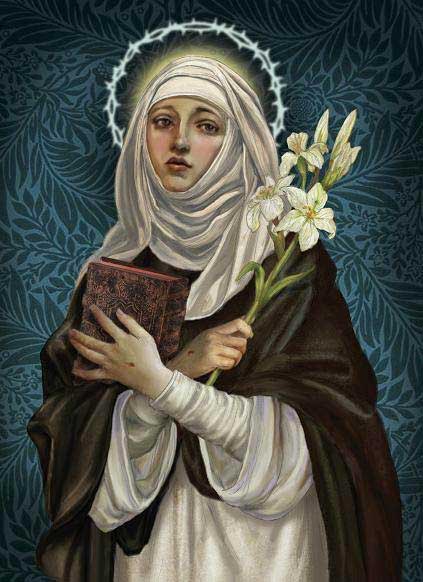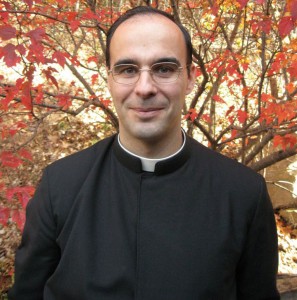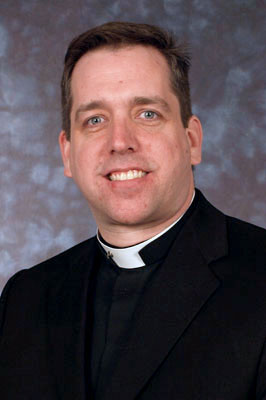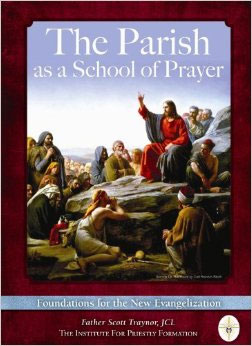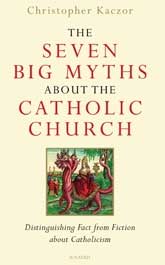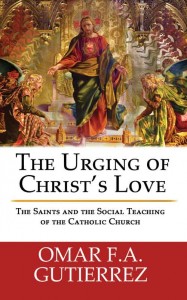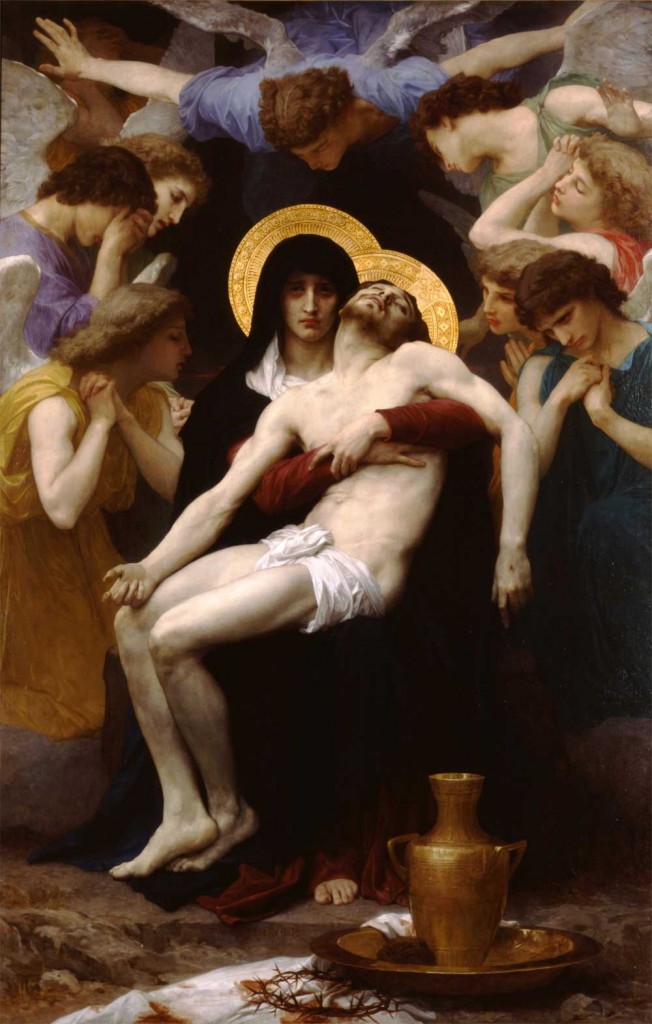Episode 10Â -The Way of Mystery: The Eucharist and Moral Living 
The Liturgy of the Eucharist part 2 : The True Meaning of “Full and Active Participation”…The Purpose of the Eucharistic Prayer.
[powerpress]
For more episodes in “The Way of Mystery” Series click here
Deacon James Keating, PhD, the director of Theological Formation for the Institute for Priestly Formation, located at Creighton University, in Omaha, is making available to â€Discerning Hearts†and all who listen, his series of programs entitled “The Way of Mysteryâ€.
 The Vatican II documents remind us that the spiritual journey is not made in a vacuum, that God has chosen to save us, not individually, but as The People of God. The Eucharist must help Christians to make their choices by discerning out of Christ’s paschal mystery. For this process to take place, however, Christians must first understand how the Eucharist puts them in touch with Christ’s passion, death, and resurrection, and what concrete implications being in touch with this mystery has for their daily lives.
The Vatican II documents remind us that the spiritual journey is not made in a vacuum, that God has chosen to save us, not individually, but as The People of God. The Eucharist must help Christians to make their choices by discerning out of Christ’s paschal mystery. For this process to take place, however, Christians must first understand how the Eucharist puts them in touch with Christ’s passion, death, and resurrection, and what concrete implications being in touch with this mystery has for their daily lives.
For more information on the “Institute of Priestly Formation†and for other material available by Deacon Keating, just click here
Don’t forget to pickup a copy of “Communion with Christ†, it is one of the best audio sets on prayer…ever!
Check out Deacon Keating’s “Discerning Heart†page
Tags: catholic, catholic podcast, catholic prayer, cathollc spirituality
This entry was posted on Tuesday, April 22nd, 2014 at 7:32 am
You can follow any responses to this entry through the RSS 2.0 feed.
Dr. Matthew Bunson discusses the life, times and teachings of St. John Damascene pt 2  [powerpress]
[powerpress]
-
Born: 676 AD, Damascus, Syria
-
Died: December 4, 749 AD, Mar Saba, Jordan
John Damascene extends these fundamental ideas to the veneration of the relics of Saints, on the basis of the conviction that the Christian Saints, having become partakers of the Resurrection of Christ, cannot be considered simply “dead”. Numbering, for example, those whose relics or images are worthy of veneration, John states in his third discourse in defence of images: “First of all (let us venerate) those among whom God reposed, he alone Holy, who reposes among the Saints (cf. Is 57: 15), such as the Mother of God and all the Saints. These are those who, as far as possible, have made themselves similar to God by their own will; and by God’s presence in them, and his help, they are really called gods (cf. Ps 82[81]: 6), not by their nature, but by contingency, just as the red-hot iron is called fire, not by its nature, but by contingency and its participation in the fire. He says in fact : you shall be holy, because I am Holy (cf. Lv 19: 2)” (III, 33, col. 1352 a). After a series of references of this kind, John Damascene was able serenely to deduce: “God, who is good, and greater than any goodness, was not content with the contemplation of himself, but desired that there should be beings benefited by him, who might share in his goodness: therefore he created from nothing all things, visible and invisible, including man, a reality visible and invisible. And he created him envisaging him and creating him as a being capable of thought (ennoema ergon), enriched with the word (logo[i] sympleroumenon), and orientated towards the spirit (pneumati teleioumenon)” (II, 2, pg 94, col. 865a). And to clarify this thought further, he adds: “We must allow ourselves to be filled with wonder (thaumazein) at all the works of Providence (tes pronoias erga), to accept and praise them all, overcoming any temptation to identify in them aspects which to many may seem unjust or iniquitous, (adika), and admitting instead that the project of God (pronoia) goes beyond man’s capacity to know or to understand (agnoston kai akatalepton), while on the contrary only he may know our thoughts, our actions, and even our future” (ii, 29, pg 94, col. 964c). Plato had in fact already said that all philosophy begins with wonder. Our faith, too, begins with wonder at the very fact of the Creation, and at the beauty of God who makes himself visible.The optimism of the contemplation of nature (physike theoria), of seeing in the visible creation the good, thebeautiful, the true, this Christian optimism, is not ingenuous: it takes account of the wound inflicted on human nature by the freedom of choice desired by God and misused by man, with all the consequences of widespread discord which have derived from it. From this derives the need, clearly perceived by John Damascene, that nature, in which the goodness and beauty of God are reflected, wounded by our fault, “should be strengthened and renewed” by the descent of the Son of God in the flesh, after God had tried in many ways and on many occasions, to show that he had created man so that he might exist not only in “being”, but also in “well-being” (cf. The Orthodox Faith, II, 1, pg 94, col. 981). With passionate eagerness John explains: “It was necessary for nature to be strengthened and renewed, and for the path of virtue to be indicated and effectively taught (didachthenai aretes hodòn), the path that leads away from corruption and towards eternal life…. So there appeared on the horizon of history the great sea of love that God bears towards man (philanthropias pelagos)”…. It is a fine expression. We see on one side the beauty of Creation, and on the other the destruction wrought by the fault of man. But we see in the Son of God, who descends to renew nature, the sea of love that God has for man. John Damascene continues: “he himself, the Creator and the Lord, fought for his Creation, transmitting to it his teaching by example…. And so the Son of God, while still remaining in the form of God, lowered the skies and descended… to his servants… achieving the newest thing of all, the only thing really new under the sun, through which he manifested the infinite power of God” (III, 1, pg 94, col. 981c-984b).
We may imagine the comfort and joy which these words, so rich in fascinating images, poured into the hearts of the faithful. We listen to them today, sharing the same feelings with the Christians of those far-off days: God desires to repose in us, he wishes to renew nature through our conversion, he wants to allow us to share in his divinity. May the Lord help us to make these words the substance of our lives.
For more visit Vatican.va
Dr. Matthew Bunson, Senior Fellow of the St. Paul Center for Biblical Theology, is one of the United States’ leading authorities on the papacy and the Church. His books include: The Encyclopedia of Catholic History; The Encyclopedia of Saints; Papal Wisdom; All Shall Be Well; Encyclopedia of the Roman Empire; and The Angelic Doctor: The Life and World of St. Thomas Aquinas; The Pope Encyclopedia; We Have a Pope! Benedict XVI, the first Catholic biography of the Holy Father in the English language; the Encyclopedia of U.S. Catholic History; Pope Francis. His also the editor of OSV’s “The Catholic Answer” magazine.
Tags: catholic, catholic podcast, catholic prayer, cathollc spirituality
This entry was posted on Tuesday, April 22nd, 2014 at 7:21 am
You can follow any responses to this entry through the RSS 2.0 feed.
 Episode 15- Seeking Truth with Sharon Doran -Announcement of the Kingdom Of God (PART 1)
Episode 15- Seeking Truth with Sharon Doran -Announcement of the Kingdom Of God (PART 1)
[powerpress]
Episode 15 –
Beatitudes (part 1)
“Blessed are…..â€
The Beatitudes. So familiar, yet do we really understand them?
In this lecture, Sharon blazes through the history of Israel, setting the stage for a deeper understanding of the meaning of the Beatitudes.
The occupied, oppressed nation of Israel was yearning for a savior, a savior that would rid them of centuries of foreign occupation.
Then Jesus arrives, working amazing miracles.
Could He be the One??
Expectations are high, but expectations are turned inside-out as Jesus proclaims the paradoxical truths of the Beatitudes.
Sharon Doran serves as the teaching director of “Seeking Truth.†An experienced Bible Study teacher, Sharon has a passion for scripture that will motivate and challenge you to immerse yourself in God’s Word and apply His message to your every day life.
 “Seeking Truth†is an in depth Catholic Bible Study, commissioned by the Archdiocese of Omaha in response to John Paul II’s call to the New Evangelization as well as Pope Benedict XVI’s exhortation for all Catholics to study scripture. To learn more go to:www.seekingtruth.net
“Seeking Truth†is an in depth Catholic Bible Study, commissioned by the Archdiocese of Omaha in response to John Paul II’s call to the New Evangelization as well as Pope Benedict XVI’s exhortation for all Catholics to study scripture. To learn more go to:www.seekingtruth.net
Tags: beatitudes, catholic, catholic podcast, catholic prayer, cathollc spirituality, Sharon Doran, The Beatitudes
This entry was posted on Tuesday, April 22nd, 2014 at 6:08 am
You can follow any responses to this entry through the RSS 2.0 feed.
From a letter to Frate Giusto di Giovanni da Volterra:
“He gave His blood out of love and it is with this love that He asks us for a drink. I mean that Jesus, who loves, is asking to be loved and served. It is only right that the one who loves ought to be loved. This is how we give our Creator a drink: when we give Him love for love. But we cannot give it to Him through any service we can render Him; no we must give it to Him in the person of our neighbor.”
Heavenly Father, your glory is in your saints. We praise your glory in the life of the admirable St. Catherine of Siena, virgin and doctor of the Church. Her whole life was a noble sacrifice inspired by an ardent love of Jesus, your unblemished Lamb. In troubled times she strenuously upheld the rights of His beloved spouse, The Church. Father, honor her merits and hear her prayers for each of us. Help us to pass unscathed through the corruption of this world, and to remain unshakably faithful to the church in word, deed, and example. Help us always to see in the Vicar of Christ an anchor in the storms of life, and a beacon of light to the harbor of your Love, in this dark night of your times and men’s souls. Grant also to each of us our special petition . . . (pause to pray for your own intentions). We ask this through Jesus, your Son, in the bond of the Holy Spirit. Amen.
St. Catherine of Siena, Pray for us.
(First paragraph excerpt taken from Letter 8 in Letters of St Catherine of Siena, Volume II translated by Suzanne Noffke OP,- published by Arizona Center for Medieval and Renaissance Studies,2001)
For the complete novena visit the St. Catherine of Siena Novena Page
Tags: catholic, catholic podcast, catholic prayer
This entry was posted on Monday, April 21st, 2014 at 2:01 pm
You can follow any responses to this entry through the RSS 2.0 feed.
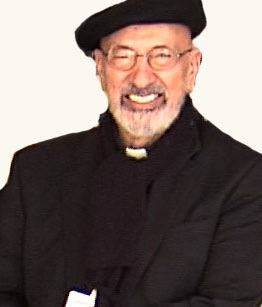 Show 62 ” Building a Kingdom of Love” – Happy Easter!!!! Have You Encountered Jesus?
Show 62 ” Building a Kingdom of Love” – Happy Easter!!!! Have You Encountered Jesus?
Gospel JN 20:1-9
On the first day of the week, Mary of Magdala came to the tomb early in the morning, while it was still dark, and saw the stone removed from the tomb. So she ran and went to Simon Peter and to the other disciple whom Jesus loved, and told them, “They have taken the Lord from the tomb, and we don’t know where they put him.†So Peter and the other disciple went out and came to the tomb. They both ran, but the other disciple ran faster than Peter and arrived at the tomb first; he bent down and saw the burial cloths there, but did not go in. When Simon Peter arrived after him, he went into the tomb and saw the burial cloths there, and the cloth that had covered his head, not with the burial cloths but rolled up in a separate place. Then the other disciple also went in, the one who had arrived at the tomb first, and he saw and believed. For they did not yet understand the Scripture that he had to rise from the dead. Lectionary for Mass for Use in the Dioceses of the United States, second typical edition, Copyright © 2001, 1998, 1997, 1986, 1970 Confraternity of Christian Doctrine;
Msgr. John A. Esseff is a Roman Catholic priest in the Diocese of Scranton. He was ordained on May 30th 1953, by the late Bishop William J. Hafey, D.D. at St. Peter’s Cathedral in Scranton, PA. Msgr. Esseff served a retreat director and confessor to Blessed Mother Teresa. He continues to offer direction and retreats for the sisters of the missionaries of charity around the world. Msgr. Esseff encountered St. Padre Pio, who would become a spiritual father to him. He has lived in areas around the world, serving in the Pontifical missions, a Catholic organization established by Bl. Pope John Paul II to bring the Good News to the world especially to the poor. Msgr. Esseff assisted the founders of the Institute for Priestly Formation and continues to serve as a spiritual director for the Institute. He continues to serve as a retreat leader and director to bishops, priests and sisters and seminarians and other religious leaders around the world.   To obtain a copy of Msgr. Esseff’s book by visiting here  Be sure to visit Msgr. Esseff’s website “Building a Kingdom of Love“
 To obtain a copy of Msgr. Esseff’s book by visiting here  Be sure to visit Msgr. Esseff’s website “Building a Kingdom of Love“
Tags: catholic, catholic podcast, catholic prayer
This entry was posted on Monday, April 21st, 2014 at 12:59 am
You can follow any responses to this entry through the RSS 2.0 feed.
“John saw the empty tomb and believed”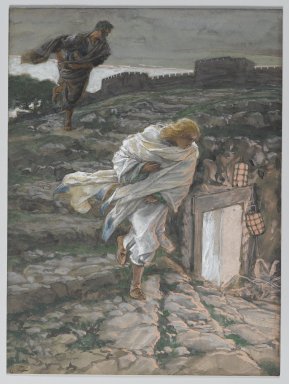
[powerpress]
an excerpt from today’s reflection by Don Schwager:
What was it like for the disciple who had stood at the cross of Jesus and then laid him in a tomb on Good Friday, to come back three days later and discover that the sealed tomb was now empty? John, along with Peter, was the first apostle to reach the tomb of Jesus on Easter Sunday morning. Like Mary Magdalene and the other disciples, John was not ready to see an empty tomb and to hear the angel’s message, Why do you seek the living among the dead (Luke 24:5)? What did John see in the tomb that led him to believe in the resurrection of Jesus? It was certainly not a dead body. The dead body of Jesus would have disproven the resurrection and made his death a tragic conclusion to a glorious career as a great teacher and miracle worker. When John saw the empty tomb he must have recalled Jesus’ prophecy that he would rise again after three days. Through the gift of faith John realized that no tomb on earth could contain the Lord and giver of life. John saw and believed (John 20:8).
John had to first deal with the empty tomb before he could meet the risen Lord later that evening along with the other apostles who had locked themselves in the upper room out of fear of the Jewish authorities (John 20:19-23). John testified as an eye-witness to the life, death, and resurrection of Jesus Christ: What we have seen, heard, and touched we proclaim as the eternal word of life which existed from the beginning (1 John 1:1-4). John bears witness to what has existed from all eternity. This “word of life” is Jesus the word incarnate, but also Jesus as the word announced by the prophets and Jesus the word now preached throughout the Christian church for all ages to come.
One thing is certain, if Jesus had not risen from the dead and appeared to his disciples, we would never have heard of him. Nothing else could have changed sad and despairing men and women into people radiant with joy and courage. The reality of the resurrection is the central fact of the Christian faith. Through the gift of the Holy Spirit, the Lord gives us “eyes of faith” to know him and the power of his resurrection. The greatest joy we can have is to encounter the living Christ and to know him personally as our Lord and Savior. Do you accept the good news of Jesus’ death and resurrection with skeptical doubt and disbelief or with trusting faith and joyful wonderment?
“Lord Jesus Christ, you have triumphed over the grave and you have won for us new life and resurrection power. Give me the eyes of faith to see you in your glory. Help me to draw near to you and to grow in the knowledge of your great love for us and your great victory over sin and death.”
for the full reflection visit : Daily Reading and Meditation
Tags: catholic, catholic podcast, catholic prayer
This entry was posted on Sunday, April 20th, 2014 at 7:49 am
You can follow any responses to this entry through the RSS 2.0 feed.
“It is finished”
[powerpress]
an excerpt from today’s reflection by Don Schwager: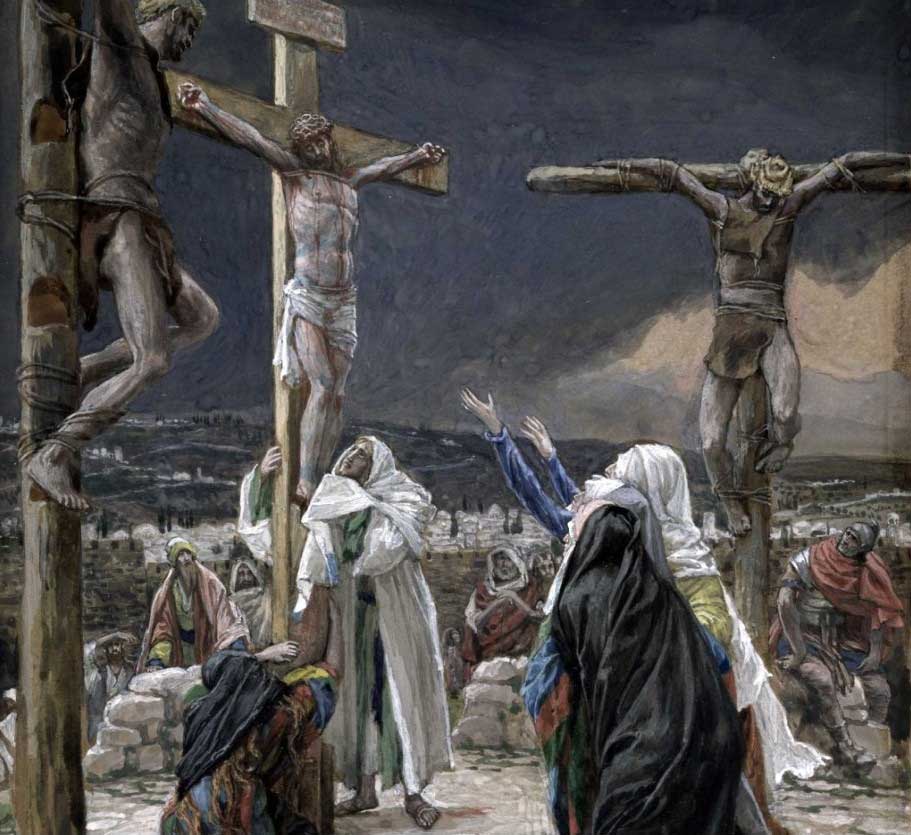
We can find no greater proof of God’s love for us than the willing sacrifice of his Son on the cross. Jesus’ parting words, “It is finished!” express triumph rather than defeat. Jesus bowed his head and gave up his spirit knowing that the strife was now over and the battle was won. Even on the cross Jesus knew the joy of victory. What the Father sent him into the world to do has now been accomplished. Christ offered himself without blemish to God and he put away sin by the sacrifice of himself (see Hebrews 9:24-26). Augustine of Hippo (430-543 A.D) comments on those who stood at the cross of Jesus:
“As they were looking on, so we too gaze on his wounds as he hangs. We see his blood as he dies. We see the price offered by the redeemer, touch the scars of his resurrection. He bows his head, as if to kiss you. His heart is made bare open, as it were, in love to you. His arms are extended that he may embrace you. His whole body is displayed for your redemption. Ponder how great these things are. Let all this be rightly weighed in your mind: as he was once fixed to the cross in every part of his body for you, so he may now be fixed in every part of your soul.” (GMI 248)
In the cross of Christ we see the triumph of Jesus over his enemies – sin, Satan, and death. Christian writers down through the centuries have sung the praises of the Cross of Christ. Paul the Apostle exclaimed, “But far be it from me to glory except in the cross of our Lord Jesus Christ” (Galatians 6:14). Hear what Gregory Nazianzen (329-389 AD), an early church father and bishop of Constantinople, wrote about the triumph of Christ’s exaltation on the cross :
“Many indeed are the wondrous happenings of that time: God hanging from a cross, the sun made dark and again flaming out; for it was fitting that creation should mourn with its creator. The temple veil rent, blood and water flowing from his side: the one as from a man, the other as from what was above man; the earth shaken, the rocks shattered because of the rock; the dead risen to bear witness to the final and universal resurrection of the dead. The happenings at the sepulcher and after the sepulcher, who can fittingly recount them? Yet no one of them can be compared to the miracle of my salvation. A few drops of blood renew the whole world, and do for all men what the rennet does for the milk: joining us and binding us together. (On the Holy Pasch, Oration 45.1)
Rupert of Deutz (1075-1129), a Benedictine theologian and abbot, wrote:
“The cross of Christ is the door to heaven, the key to paradise, the downfall of the devil, the uplifting of mankind, the consolation of our imprisonment, the prize for our freedom.”
The Cross of Christ is the safeguard of our faith, the assurance of our hope, and the throne of love. It is also the sign of God’s mercy and the proof of forgiveness. By his cross Jesus Christ has pardoned us and set us free from the tyranny of sin. He paid the price for us when he made atonement for our sins. The way to peace, joy, and righteousness in the kingdom of God and the way to victory over sin and corruption, fear and defeat, despair and death is through the cross of Jesus Christ. Do you follow the Lord Jesus in his way of the cross with joy, hope, and confidence? “Lord Jesus Christ, by your death on the cross you have won pardon for us and freedom from the tyranny of sin and death. May I live in the joy and freedom of your victory over sin and death.” for the full reflection visit : Daily Reading and Meditation
Tags: catholic, catholic podcast, catholic prayer
This entry was posted on Friday, April 18th, 2014 at 6:21 am
You can follow any responses to this entry through the RSS 2.0 feed.
FG#14 – The Way of Trust and Love Ep 3Â – Fountains of Grace: reflections on contemporary spiritual classics with Donna Garrett Join host Donna Garrett, with Fr. James Perez, LC, as they discuss the spiritual classic “The Way of Trust and Love: A Retreat Guided By St. Therese of Lisieux” by Fr. Jacques Philippe. [powerpress] Discussed in this episode, among other topics, from “The Way of Trust and Love”
Join host Donna Garrett, with Fr. James Perez, LC, as they discuss the spiritual classic “The Way of Trust and Love: A Retreat Guided By St. Therese of Lisieux” by Fr. Jacques Philippe. [powerpress] Discussed in this episode, among other topics, from “The Way of Trust and Love”
We began to look more deeply into humility in the previous chapter. I think a good definition of humility may be this: being in the right relation to ourselves, which enables us to be in the right relation to God and to other people; relating to ourselves according to the truth of what and how we are. One of its essential aspects , as we have seen, is peacefully accepting our weakness and inner poverty.
If we accept ourselves as we are, we also accept God’s love for us. But if we reject ourselves, if we despise ourselves, we shut ourselves off from the love God has for us, we deny that love. If we accept ourselves in our weakness, our limitations, it will also be easier for us to accept other people. Often, quite simply, we can’t get along with other people because we can’t get along with ourselves . We have all experienced this at some point. Sometimes we are unhappy with ourselves because we’ve made mistakes or fallen into a fault that humiliates us, so we are really annoyed with ourselves. That makes us bad-tempered and even aggressive with others. What does this mean? Just that we make others pay for our difficulty in accepting our own inner poverty. Not accepting our limitations, we take it out on other people … This reaction is very common, and obviously unfair and contrary to the truth. Most of our conflicts others are nothing more than a projection of the conflicts we are having with ourselves. The opposite is also true. The more we accept ourselves as we are and are reconciled to our own weakness, the more we can accept other people and love them as they are.
For other episodes in the this series click here “Fountains of Grace w/Donna Garrett“
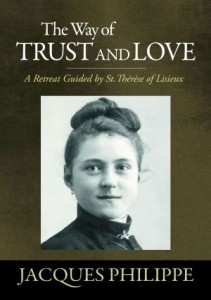 You can find “The Way of Trust and Love” here
You can find “The Way of Trust and Love” here
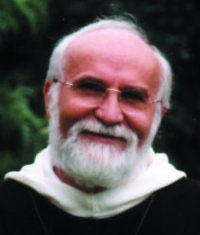
Fr. Jacques Philippe
Tags: catholic, catholic podcast, catholic prayer
This entry was posted on Thursday, April 17th, 2014 at 3:57 pm
You can follow any responses to this entry through the RSS 2.0 feed.
“How much more will your Father who is in heaven give good things to those who ask him!”
[powerpress]
an excerpt from today’s reflection by Don Schwager: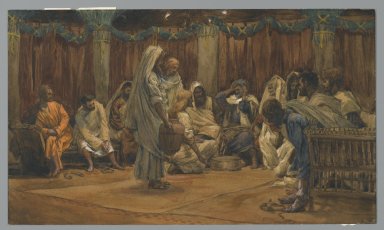
Does your love waver when you encounter bitter disappointments and injury from others? As Jesus’ hour of humiliation draws near he reveals to his disciples the supreme humility which shaped the love he had for them. He stoops to perform a menial task reserved for servants – the washing of smelly, dirty feet. In stooping to serve his disciples Jesus knew he would be betrayed by one of them and that the rest would abandon him through disloyalty. Such knowledge could have easily led to bitterness or hatred. Jesus met the injury of betrayal and disloyalty with the greatest humility and supreme love.
Jesus loved his disciples to the very end, even when they failed him and forsook him. The Lord loves each of us unconditionally. His love has power to set us free to serve others with Christ-like compassion and humility. Does the love of Christ rule in your heart, thoughts, intentions and actions?
Saint Augustine of Hippo in his sermon for this day, wrote:
“He had the power of laying down his life; we by contrast cannot choose the length of our lives, and we die even if it is against our will. He, by dying, destroyed death in himself; we are freed from death only in his death. His body did not see corruption; our body will see corruption and only then be clothed through him in incorruption at the end of the world. He needed no help from us in saving us; without him we can do nothing. He gave himself to us as the vine to the branches; apart from him we cannot have life.Finally, even if brothers die for brothers, yet no martyr by shedding his blood brings forgiveness for the sins of his brothers, as Christ brought forgiveness to us. In this he gave us, not an example to imitate but a reason for rejoicing. Inasmuch, then, as they shed their blood for their brothers, the martyrs provided “the same kind of meal” as they had received at the Lord’s table. Let us then love one another as Christ also loved us and gave himself up for us.”
“Lord Jesus, your love conquers all and never fails. Help me to love others freely, with heart-felt compassion , kindness and goodness. Where there is injury, may I sow peace rather than strife.”
for the full reflection visit : Daily Reading and Meditation
Tags: catholic, catholic podcast, catholic prayer
This entry was posted on Thursday, April 17th, 2014 at 11:14 am
You can follow any responses to this entry through the RSS 2.0 feed.
SP#7Â The School of Prayer: Foundations for the New Evangelization
Fr. Scott Traynor talks about the importance of “spiritual friendship or companionship”.  He discusses “heart-sharing” between spouses, but also in friendship with others.  He give us models on how this can look.  Fr. Scott also helps us to understand the difference between ordinary relationships and the unique gift of the “spiritual friendship”.  What is a healthy sharing relationship and what are the signs of unhealthy ones which we may want to avoid.
In Father Scott Traynor’s book, Blessed John Paul II’s memorable call to make of the parish a school of prayer takes on flesh and becomes concretely attainable. Those you read these faith-filled pages will find renewed desire to create such parishes and a clear road-map toward this goal.
–Father Timothy Gallagher, OMV
Father Scott Traynor received his STB from the Pontifical Gregorian University and his JCL from Catholic University of America. He has been an instructor and spiritual director for many of the programs at the Institute for Priestly Formation.
Father Traynor is a retreat master and spiritual director who has travelled the country as a speaker at various conferences, diocesan gatherings and national conferences.. He is especially sought after to present on the topics of prayer, discernment and priestly identity and mission.
He serves the Rector of the St. John Vianney Theological Seminary in Denver Colorado.
Tags: catholic, catholic podcast, catholic prayer
This entry was posted on Wednesday, April 16th, 2014 at 4:36 pm
You can follow any responses to this entry through the RSS 2.0 feed.
In”The Seven Big Myths about Marriage: What Science, Faith and Philosophy Teach Us about Love and Happiness”, Dr. Christopher Kaczor, 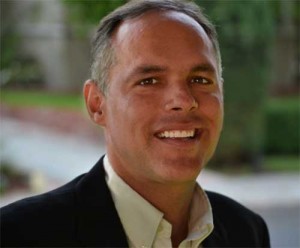 along with his wife Jennifer, shines an important light of truth on one of the most important issues of our day.  Beginning with basic foundational principals and understandings, Dr. Kaczor rationally examines key issues in the marriage debate and carefully, and quite thoroughly, debunks the leading “myths” about marriage.  An excellent resource and HIGHLY recommended for all who care about and engage in the discussions on marriage.
along with his wife Jennifer, shines an important light of truth on one of the most important issues of our day.  Beginning with basic foundational principals and understandings, Dr. Kaczor rationally examines key issues in the marriage debate and carefully, and quite thoroughly, debunks the leading “myths” about marriage.  An excellent resource and HIGHLY recommended for all who care about and engage in the discussions on marriage.
[powerpress]
You can find the book here
If I were a pastor, I would make this book required reading for engaged couples in all my marriage classes. —Peter Kreeft, Ph.D., Author, Jacob s Ladder: Ten Steps to Truth
The media portrayals of the public debates over marriage and its meaning often generate more heat than light. In this carefully crafted and accessible book, Professor Kaczor provides just the sort of illumination that is absent from those portrayals. I cannot think of a better book that offers such a clear and winsome account of marriage and its meaning, and what that tells us about human dignity and happiness. —Francis J. Beckwith, Professor of Philosophy, Baylor University
‘Don’t miss:
IP#182 Dr. Christopher Kaczor – The Seven Big Myths About the Catholic Church on Inside the Pages
and
“Life Issues” ….In Conversation with Dr. Christopher Kaczor
Tags: catholic, catholic podcast, catholic prayer
This entry was posted on Wednesday, April 16th, 2014 at 1:47 pm
You can follow any responses to this entry through the RSS 2.0 feed.

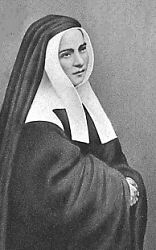 The best movie on the life of St. Bernadette is actually a pair of films starring Sydney Penny and distributed by Ignatius Press: “Bernadette” and “The Passion of Bernadette”. Sydney does an extraordinary job capturing the feverent love, joy and enthusiasm that encapsulates the heart of St. Bernadette. They are a joy to watch…our little saint is no sad victim, but instead a tremendous witness to the virtuous life and the grace of God.
The best movie on the life of St. Bernadette is actually a pair of films starring Sydney Penny and distributed by Ignatius Press: “Bernadette” and “The Passion of Bernadette”. Sydney does an extraordinary job capturing the feverent love, joy and enthusiasm that encapsulates the heart of St. Bernadette. They are a joy to watch…our little saint is no sad victim, but instead a tremendous witness to the virtuous life and the grace of God.
Tags: catholic, catholic podcast, catholic prayer
This entry was posted on Wednesday, April 16th, 2014 at 12:46 am
You can follow any responses to this entry through the RSS 2.0 feed.
The tragedy of the betrayal
[powerpress]
an excerpt from today’s reflection by Don Schwager: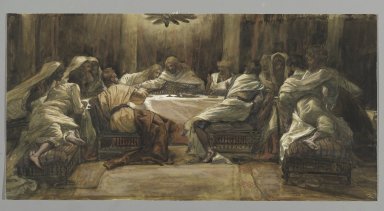
Why did Judas betray his Master? Was his treachery motivated by greed, bitter disappointment with Jesus, or hatred because of disillusionment? It may be that Judas never intended for his Master to die. Maybe he thought Jesus was proceeding too slowly and not acting aggressively enough in setting up his messianic kingdom. Perhaps Judas wanted to force Jesus’ hand by compelling him to act. Nonetheless, his tragedy was his refusal to accept Jesus as he was.
Origen, a 3rd century bible scholar and church father, comments on Judas’ betrayal: “Let us consider what Judas said to the Jewish priests: What will you give me if I hand him over to you? He was willing to take money in exchange for handing over the Word of God. They do the same thing who accept sensual or worldly goods in exchange for handing over and casting out from their souls the Savior and Word of truth who came to dwell with them. Indeed, it would be fitting to apply Judas’s example to all who show contempt for the Word of God and betray him, as it were, by committing sin for the sake of money or for any selfish motive. People who behave in this way appear openly to be calling out to the powers of the enemy who offer worldly gain in return for the sin of betraying God’s Word, saying, What will you give me if I hand him over to you? And they gave him thirty pieces of silver. The number of coins they gave Judas was equivalent to the number of years the Savior had sojourned in this world. For at the age of thirty, he was baptized and began to preach the gospel, like Joseph was thirty years old when he began to gather grain for his brothers (Genesis 41:46). Just as at that time the grain was prepared by God for the sons of Israel but given also to the Egyptians, so also the gospel was prepared for the saints but preached also to the unfaithful and wicked.†[Commentary on Matthew 78.]
Jesus knew beforehand what would befall him. As Jesus ate the passover meal with his twelve apostles he put them under trial and suspicion (one of you will betray me) to teach them to examine themselves rightly, lest they be highminded and think themselves more strong than they were. We, also must examine ourselves in the light of God’s truth and grace and ask him to strengthen us in faith, hope, and love that we may not fail him or forsake him when we are tempted. Do you pray with confidence in the words Jesus gave us to pray: Do not lead us into temptation, but deliver us from evil (Matthew 6:13)?
“God our Father, we are exceedingly frail and indisposed to every virtuous and gallant undertaking. Strengthen our weakness, we beseech you, that we may do valiantly in this spiritual war; help us against our own negligence and cowardice, and defend us from the treachery of our unfaithful hearts; for Jesus Christ’s sake.” (Prayer of Thomas a Kempis)
for the full reflection visit : Daily Reading and Meditation
Tags: catholic, catholic podcast, catholic prayer
This entry was posted on Wednesday, April 16th, 2014 at 12:09 am
You can follow any responses to this entry through the RSS 2.0 feed.
Episode 39- Regnum Novum: Bringing forth the New Evangelization through Catholic Social Teaching with Omar Gutierrez  – We continue the study of the “Compendium of the Social Doctrine of the Church” Â Chapter 12 “Social Doctrine and Ecclesial Action”
– We continue the study of the “Compendium of the Social Doctrine of the Church” Â Chapter 12 “Social Doctrine and Ecclesial Action”
[powerpress]
CHAPTER TWELVE
SOCIAL DOCTRINE AND ECCLESIAL ACTION
I. PASTORAL ACTION IN THE SOCIAL FIELD
a. Social doctrine and the inculturation of faith
b. Social doctrine and social pastoral activity
c. Social doctrine and formation
d. Promoting dialogue
e. The subjects of social pastoral activity
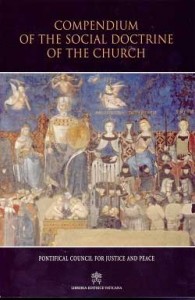
We live at a very special time. The confluence of many things has brought forth the clear need to be able to articulate the Social Teaching of the Catholic Church in a way that is accessible and applicable. This is not to be an effort where high-minded theories are to be bandied about. Rather, this is a time of opportunity wherein we can apply the Social Doctrine to the concrete so as to bring about a New Kingdom, a Revolution. – Omar G.
Also visit Omar’s “Discerning Hearts” page Catholic Social Teaching 101
You can find Omar Gutierrez’s book here
In The Urging of Christ’s Love Omar Gutiérrez tells the stories of eleven people who lived their lives in pursuit of Christ Jesus. Each Saint, Blessed or Servant of God is considered in the context of Catholic Social Teaching. Then at the end of each chapter a prayer is offered and quotes from the Compendium of the Social Doctrine of the Church are provided in order to link the lessons we can learn from the saint’s life to Church teaching. By discovering some new saint friends, and rediscovering some old ones, The Urging of Christ’s Love presents Catholic Social Teaching in an accessible and important way.
Tags: catholic, catholic podcast, catholic prayer
This entry was posted on Monday, April 14th, 2014 at 3:45 pm
You can follow any responses to this entry through the RSS 2.0 feed.
Fr. James Rafferty and Deacon James Keating offered a Lenten Morning of Reflection on behalf of the Institute for Priestly Formation entitled “Into Your Hands I Commend My Spiritâ€.
William-Adolphe Bouguereau’s “Pieta” was used as the vocal point for reflection, as well as the following passages:
From  John 3:16-17
For God so loved the world that he gave*Â his only Son, so that everyone who believes in him might not perish but might have eternal life.k17For God did not send his Son into the world to condemn*Â the world, but that the world might be saved through him.l
Excerpts from Pope Francis’ encyclical “Light of Faith“:
Our culture has lost its sense of God’s tangible presence and activity in our world. We think that God is to be found in the beyond, on another level of reality, far removed from our everyday relationships. But if this were the case, if God could not act in the world, his love would not be truly powerful, truly real, and thus not even true, a love capable of delivering the bliss that it promises. It would make no difference at all whether we believed in him or not. Christians, on the contrary, profess their faith in God’s tangible and powerful love which really does act in history and determines its final destiny: a love that can be encountered, a love fully revealed in Christ’s passion, death and resurrection.
Yet it is precisely in contemplating Jesus’ death that faith grows stronger and receives a dazzling light; then it is revealed as faith in Christ’s steadfast love for us, a love capable of embracing death to bring us salvation. This love, which did not recoil before death in order to show its depth, is something I can believe in; Christ’s total self-gift overcomes every suspicion and enables me to entrust myself to him completely.
- Fr. James Rafferty, S.T.D. Director of Programs and Mission
- Deacon James Keating, Ph.D. Director of Theological Formation
Tags: catholic, catholic podcast, catholic prayer
This entry was posted on Monday, April 14th, 2014 at 6:42 am
You can follow any responses to this entry through the RSS 2.0 feed.



